Enterprise Chatbot Use Cases and the Solutions That Excel
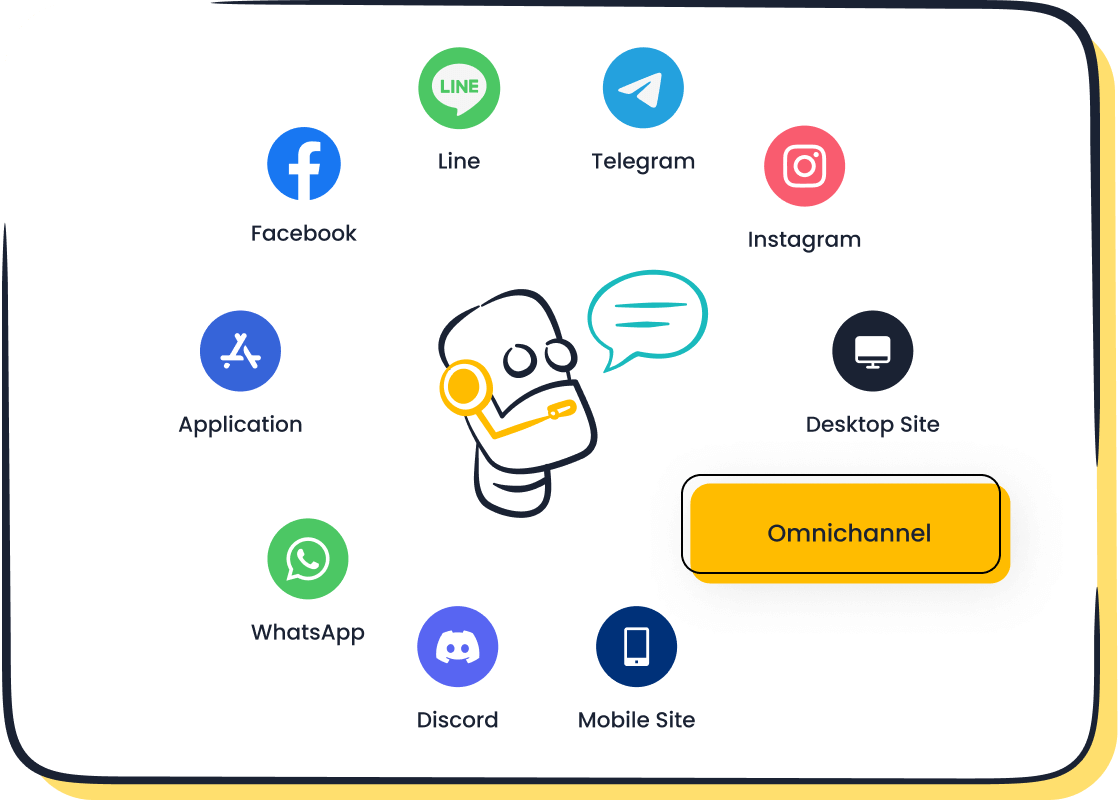
Businesses now recognize enterprise chatbot use cases as essential for driving customer engagement, sales, and operational efficiency. Sobot leads with advanced AI and omnichannel capabilities that help companies automate up to 79% of routine customer queries and cut support costs by 30%. Sobot AI enables seamless customer contact, improves lead quality, and boosts conversion rates. The best ai chatbots, including Sobot, deliver measurable results in ecommerce and support settings. Recent data shows that 88% of customers used chatbots in 2022 and 2023, and 62% now prefer chatbots over waiting for human agents.
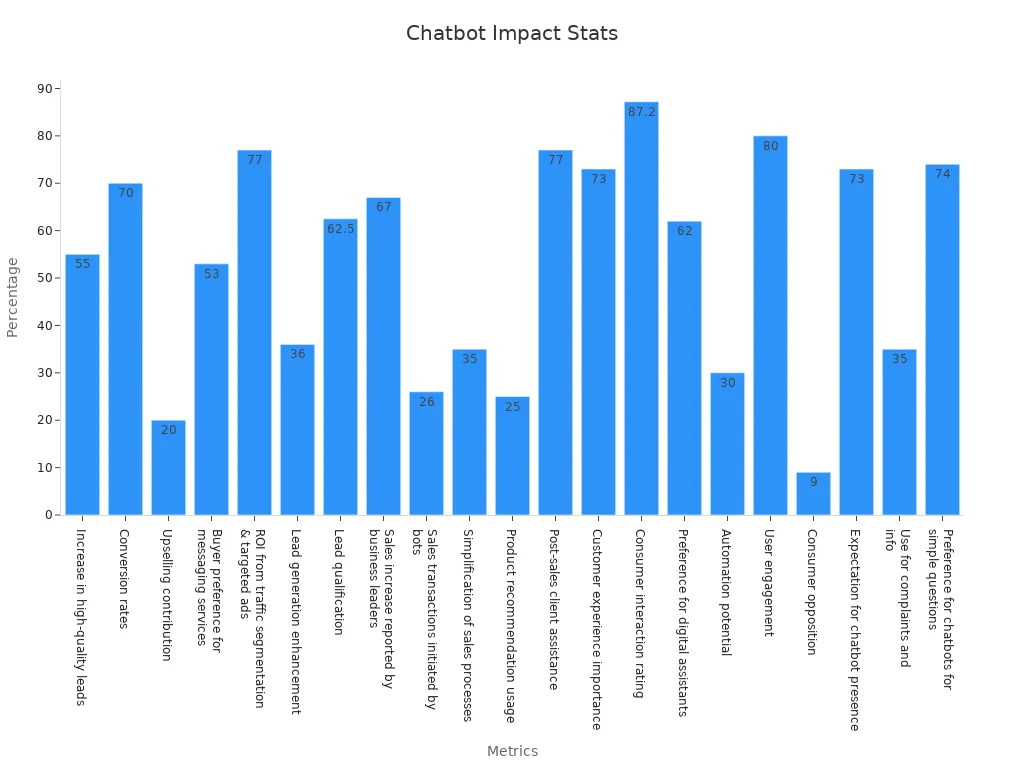
Enterprise Chatbots Overview
What Are Enterprise Chatbots
Enterprise chatbots are advanced digital assistants that use artificial intelligence to automate conversations and tasks for businesses. These solutions operate across multiple channels, such as websites, messaging apps, and voice platforms. They use technologies like natural language processing and machine learning to understand user intent, provide instant answers, and guide users through processes. Industry experts describe enterprise chatbots as tools that improve efficiency for both employees and customers by handling inquiries, automating workflows, and maintaining context throughout interactions.
The evolution of chatbots shows rapid progress in technology and business adoption. Early chatbots like ELIZA in the 1960s started with simple pattern matching. Over time, chatbots such as SmarterChild, Siri, and Alexa introduced more natural interactions and voice recognition. Today, ai chatbots for enterprise, like Sobot, deliver human-like conversations and integrate with business systems to support complex tasks.
| Chatbot Name | Year Created | Creator | Key Contributions and Evolutionary Notes |
|---|---|---|---|
| Dr. Sbaitso | 1992 | Creative Labs | Early AI chatbot with voice-operated conversation simulating a psychologist. |
| A.L.I.C.E. | 1995 | Richard Wallace | Used heuristic pattern matching and AIML for conversation rules, pioneering language processing chatbots. |
| Smarter Child | 2001 | N/A | Operated on AOL IM and MSN Messenger, provided quick info retrieval, precursor to modern assistants. |
| Siri | 2010 | Apple | Smart personal assistant with multi-modal interaction (text, audio, video), enhancing user engagement and task handling. |
| Google Now/Assistant | 2012 | Location/time-based info delivery evolving into predictive search and voice assistant capabilities. | |
| Cortana | 2014 | Microsoft | Integrated voice recognition assistant for Windows devices, capable of multitasking and reminders. |
| Alexa | 2014 | Amazon | Voice-controlled smart assistant with developer ecosystem for skills, integrated into smart home devices. |
| ChatGPT | 2022 | OpenAI | Large language model enabling human-like text generation, used for content creation and complex conversational tasks. |
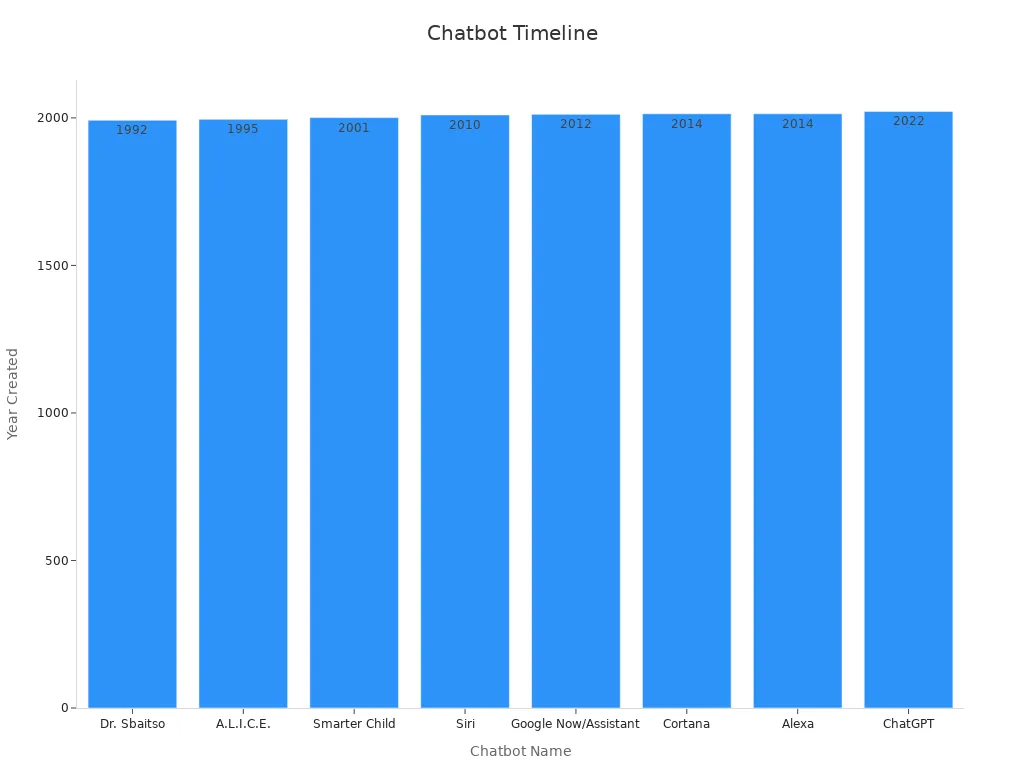
Key Benefits
Enterprise chatbots deliver measurable value across industries. Businesses report up to 30% reduction in customer service costs and 80-90% lower cost per interaction compared to human support. These chatbots handle thousands of conversations at once, providing instant responses and reducing wait times. In e-commerce, ai chatbots for enterprise offer 24/7 support, personalized recommendations, and help reduce cart abandonment. Healthcare and finance sectors use chatbots for triage, appointment scheduling, and fraud detection.
Sobot, as a leading enterprise chatbot platform, demonstrates these benefits with its AI-powered, multilingual, and omnichannel capabilities. Sobot helps companies automate routine queries, improve agent productivity, and boost customer satisfaction. Key performance indicators for enterprise chatbots include conversation volume, satisfaction scores, conversion rates, and returning user metrics. For example, 59% of consumers expect replies within five seconds, and chatbots meet this demand, increasing engagement and loyalty.
| Benefit Category | Statistical Evidence / Metric | Impact Description |
|---|---|---|
| Cost Savings | Up to 30% reduction in customer service costs | Automation of routine inquiries reduces operational expenses |
| Cost per Interaction | $0.50 to $0.70 per chatbot session vs. $19.50 per hour for humans | Significantly lower cost per interaction |
| Customer Response Time | 59% of consumers expect responses within 5 seconds | Instant replies improve customer satisfaction and reduce churn |
| Customer Engagement | 70% increase in customer interactions | Personalized recommendations and CRM integration boost engagement and retention |
| Sales Conversion | Up to 3x increase in conversion rates compared to traditional methods | Chatbots qualify leads and guide purchases effectively |
| Scalability | Ability to handle thousands of simultaneous conversations | Supports peak demand without additional staffing costs |
Note: Enterprise chatbots continue to evolve, offering businesses new ways to scale operations, improve customer experience, and drive revenue growth. For more on Sobot’s capabilities, visit Sobot’s official website.
Enterprise Chatbot Use Cases
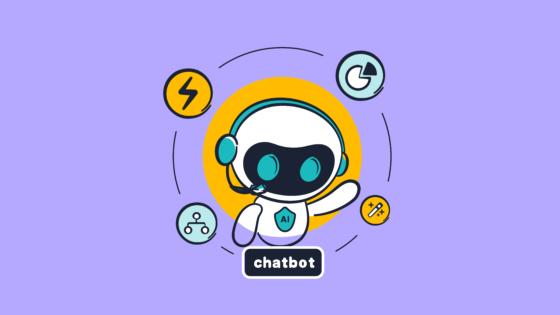
Customer Service
Customer service stands as one of the most prominent enterprise chatbot use cases. Companies deploy chatbots to answer questions, resolve issues, and guide users through processes at any time of day. Sobot’s AI-powered chatbot delivers 24/7 automated customer service, ensuring immediate assistance even outside traditional business hours. This approach helps businesses meet the growing demand for instant replies, as 74% of customers now prefer chatbots for basic interactions.
Sobot’s multilingual support and intelligent knowledge base integration allow companies to serve global audiences with accurate, unbiased responses. For example, OPPO, a leading smart device brand, partnered with Sobot to manage high volumes of customer inquiries during peak shopping periods. By automating repetitive queries, OPPO achieved an 83% chatbot resolution rate and a 94% positive feedback rate. These results show how chatbots can reduce customer support tickets and improve satisfaction.
Companies using chatbots report up to 30% cost savings in customer service operations, with faster complaint resolution and higher user satisfaction (source).
| Metric | Result | Impact |
|---|---|---|
| Chatbot Resolution Rate | 83% | More queries handled automatically |
| Positive Feedback Rate | 94% | Higher customer satisfaction |
| Repurchase Rate Increase | 57% | Improved customer loyalty |
Sales and Ecommerce
Sales and ecommerce represent another critical area for enterprise chatbot use cases. Chatbots help businesses engage shoppers, recommend products, and guide users through checkout. Sobot’s omnichannel chatbot interacts with customers across websites, messaging apps, and social media, creating a seamless shopping experience.
Retailers using chatbots have seen conversion rates rise by over 20%. Sobot’s proactive push messaging and real-time intent assistance boost conversions and reduce cart abandonment. For instance, Alibaba Group reported a 35% conversion lift after implementing AI chatbots, while H&M saw a 35% sales increase. These improvements stem from chatbots’ ability to provide instant answers and personalized recommendations.
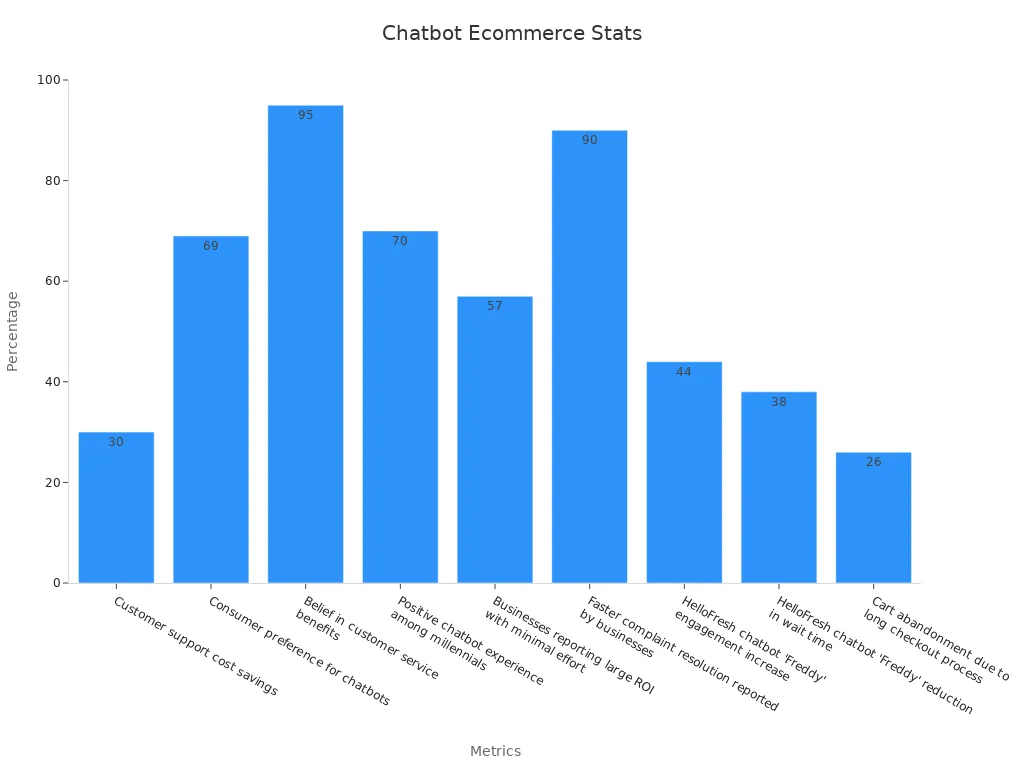
95% of consumers believe customer service benefits the most from chatbots, and 69% prefer chatbots for quick replies to simple questions.
| Metric / Outcome | Statistic / Result | Context / Example |
|---|---|---|
| Conversion Rate Increase | 20%+ | General ecommerce uplift |
| Sales Increase | 35% | H&M ecommerce operations |
| Average Order Value Increase | 20% | Alibaba targeted recommendations |
| Cart Abandonment Reduction | 26% | Shorter checkout with chatbots |
Support and Success
Support and customer success teams use chatbots to resolve issues quickly and keep customers happy. These enterprise chatbot use cases focus on automating repetitive support tasks, providing instant answers, and escalating complex issues to human agents when needed. Sobot’s chatbot integrates with ticketing systems and knowledge bases, helping teams deliver accurate solutions and save time.
Businesses report a 77% reduction in average handle time and a 30% drop in customer service costs after adopting chatbots. Sobot’s advanced analytics and reporting tools help companies track performance and optimize support processes. As a result, 80% of executives see improvements in customer satisfaction and contact center performance.
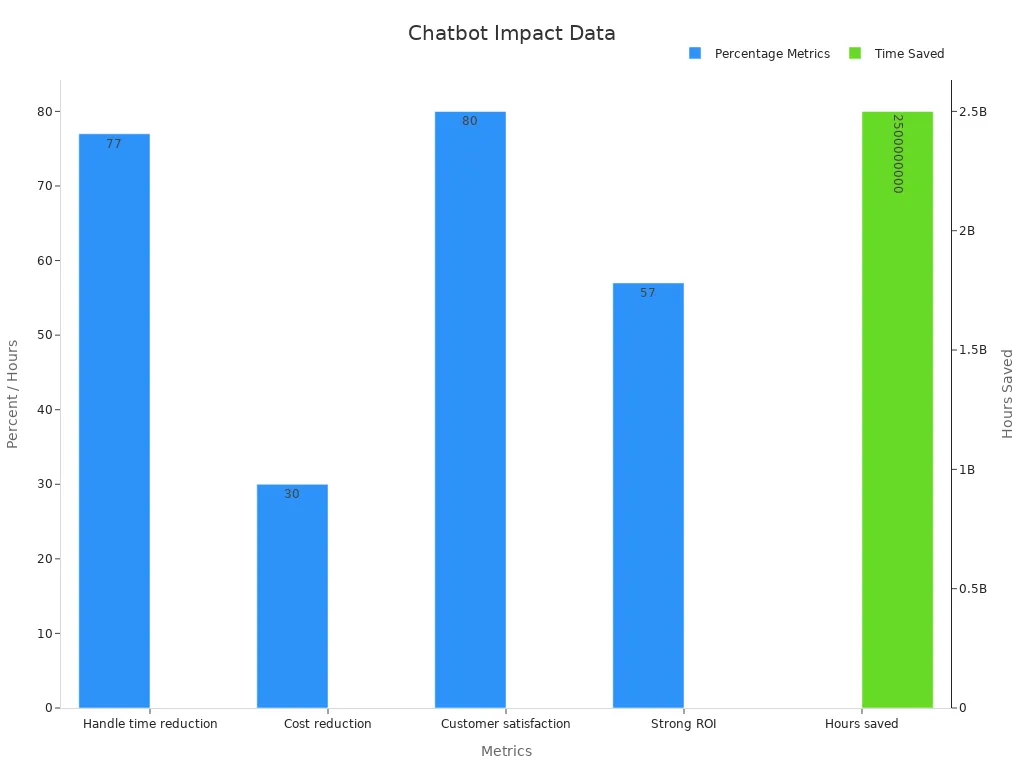
- 2.5 billion hours saved by chatbots in customer service by 2023
- 77.6% of Customer Success leaders plan to increase AI and automation use by 2025
Call Centers
Call centers benefit greatly from enterprise chatbot use cases. Chatbots can autonomously resolve up to 80% of routine queries, which reduces costs and speeds up response times. Sobot’s AI-driven platform routes complex issues to human agents, allowing staff to focus on high-value interactions.
Nearly 45% of customers find wait times of up to 15 minutes frustrating. Chatbots help reduce these wait times by handling simple requests and automating tasks like appointment scheduling and order processing. Gartner predicts that conversational AI will save up to $80 billion in global agent labor costs and reduce the number of customer service agents by 30% by 2026.
| Evidence Aspect | Data / Finding |
|---|---|
| Routine Query Resolution | Up to 80% by chatbots |
| Wait Time Reduction | Significant decrease in customer wait times |
| Agent Labor Cost Savings | Up to $80 billion globally (Gartner) |
| Agent Reduction Forecast | 30% fewer agents by 2026 due to AI automation |
| Response Time Improvement | 40% faster response times (Nextiva) |
Sobot’s omnichannel and AI-driven features ensure consistent, personalized support across all platforms, making it a top choice for modern call centers.
Best AI Chatbots for Business
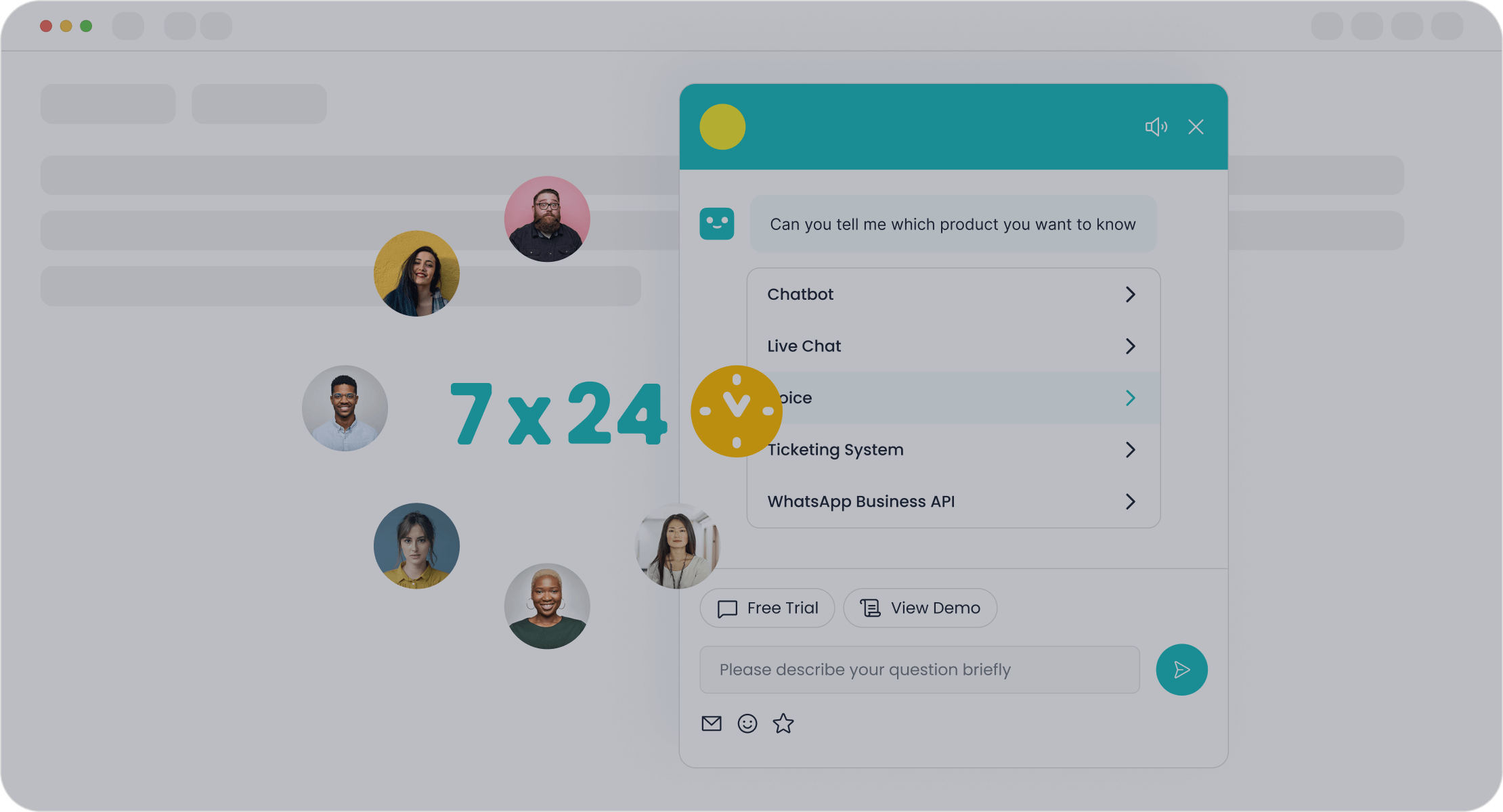
Sobot Chatbot
Sobot stands out among the best ai chatbots for business due to its advanced AI and omnichannel capabilities. Sobot’s platform uses predictive intelligence and deep learning to deliver personalized recommendations and proactive problem-solving. Businesses benefit from seamless CRM integration, advanced natural language processing, and continuous improvement based on every customer interaction. Sobot’s Five-AI system covers omnichannel, scenario-based, multi-faceted, generative, and secure AI, ensuring comprehensive support for customers, agents, and administrators.
Key performance metrics highlight Sobot’s leadership among the best ai chatbots. The platform achieves high resolution rates, often surpassing 60% with a robust knowledge base. First contact resolution rates increase, and answer accuracy remains high due to integration with multiple large language models. Sobot’s AI Copilot tools help agents by suggesting replies and drafting summaries, which boosts efficiency. The platform supports chat, voice, email, social media, phone calls, and SMS, making it a top ai chatbot for business in diverse industries.
| Performance Metric | Sobot’s Impact |
|---|---|
| Resolution Rate | 60%+ with extensive knowledge base |
| Agent Efficiency | AI Copilot boosts productivity |
| Omnichannel Support | Chat, voice, email, social, phone, SMS |
| Predictive Intelligence | Anticipates needs, provides proactive solutions |
| Security & Compliance | Global data privacy, regional data centers |
Sobot’s mature models and knowledge graphs, combined with over a decade of experience, make it a trusted choice for companies seeking the best ai chatbots for business.
Other Leading Solutions
The best ai chatbots for business include several well-known platforms. Academic research from ACM highlights that user satisfaction depends on responsiveness, conversational tone, service quality, and privacy. High information and service quality drive satisfaction and continued use. Market data shows that ChatGPT leads in search volume and benchmark performance, while other providers like Mistral and Cohere focus on open-source and secure AI.
A six-month comparative analysis across 17 platforms found that the best ai chatbots automate 65-75% of routine inquiries and resolve over 70% of issues without human escalation. Key evaluation criteria include security, integration, scalability, cost, and user experience. Businesses should select an ai chatbot for business that aligns with their needs for automation, omnichannel presence, and data insights.
| AI Chatbot Provider | Key Features | Market Positioning |
|---|---|---|
| OpenAI (ChatGPT) | High benchmark, closed source | Category leader |
| Mistral | Open-source, efficient | Rapid growth in Europe |
| Cohere | Private, secure AI | Focus on complex industries |
| Perplexity | Search + conversational AI | Innovative challenger |
The best ai chatbots for business deliver measurable improvements in customer satisfaction, agent productivity, and operational efficiency. Companies should evaluate chatbots using validated metrics and real-world performance data (source).
Choosing Enterprise Chatbots
Key Criteria
Selecting the right enterprise chatbot platform requires a clear understanding of business goals and measurable benchmarks. Companies should set objectives using the SMART framework, such as aiming to resolve 80% of customer inquiries or increasing sales by 20% within a set period. Reliable chatbots must deliver accurate responses, fast interaction, and high usability. Research shows that users trust chatbots more when recommendations are reliable and dialogue quality is high. Usability, response appropriateness, and error management are essential for building trust and driving adoption.
The following table summarizes key performance indicators and their business impact:
| Metric Category | Key Performance Indicators | Measurement Approach | Business Impact |
|---|---|---|---|
| Cost Reduction | Call deflection, handling time, training savings | Compare before and after implementation | Lower operational costs |
| Customer Experience | Response time, first contact resolution, satisfaction | Compare chatbot to traditional channels | Higher loyalty and retention |
| Operational Efficiency | Process time, error reduction, productivity | Measure improvements in processes | Optimize business operations and resources |
| Strategic Value | New insights, innovation, differentiation | Qualitative assessment | Long-term growth and market advantage |
Companies should also monitor metrics like conversation volume, user satisfaction scores, and containment rate. Aiming for a task completion rate above 70% and response times under two seconds helps maintain engagement and satisfaction.
Integration and Scalability
A successful enterprise chatbot platform must integrate smoothly with existing business operations and scale as needs grow. Integration ranges from simple website connectors to full enterprise system connections with custom workflows. For example, Sobot offers omnichannel support, connecting chat, email, voice, and social media into one workspace. This integration allows teams to improve team productivity and deliver consistent service.
Scalability ensures the chatbot can handle peak usage and support global operations. Large organizations like Workday and the International Committee of the Red Cross have shown that AI chatbots can resolve up to 65% of inquiries and automate 80% of routine tasks. Sobot’s platform supports automatic scaling and load balancing, making it suitable for businesses with high traffic and complex needs. By automating routine tasks, companies free employees to focus on strategic work, further optimizing business operations.
Tip: Regularly review analytics and user feedback to ensure the chatbot continues to meet business goals and adapts to changing demands.
Sobot in Action
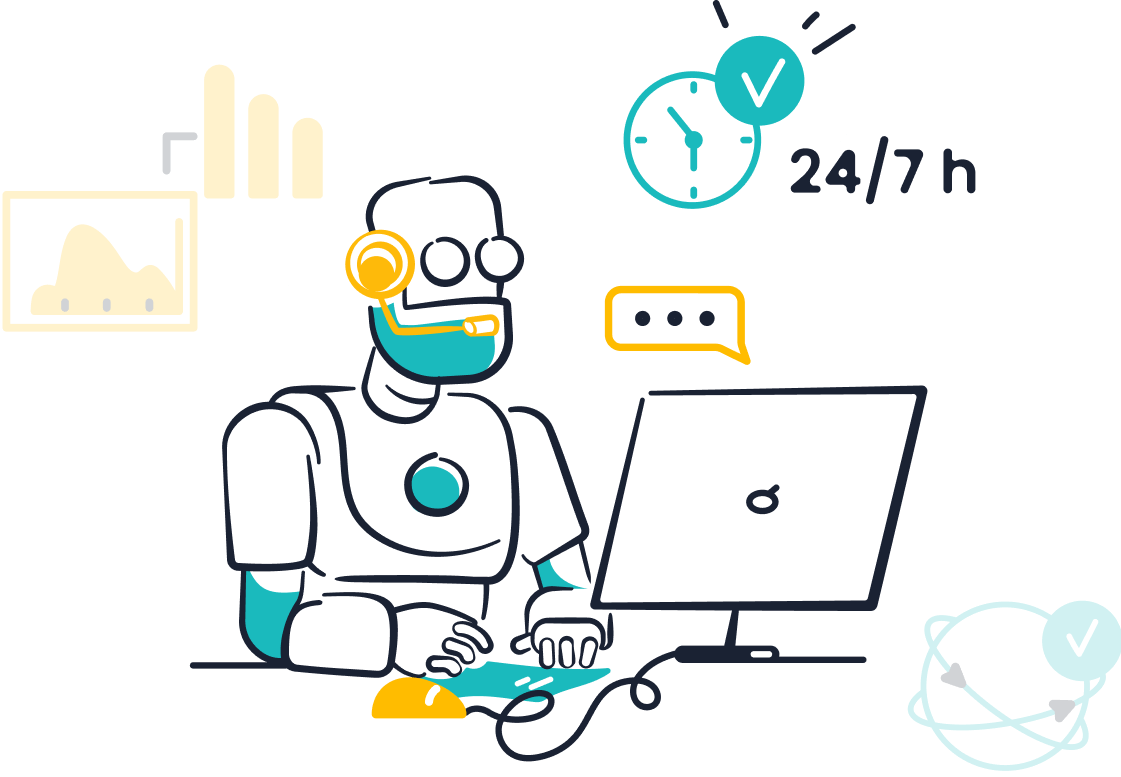
OPPO Success Story
OPPO, a global leader in smart devices, faced a surge in customer inquiries during peak shopping seasons. The company needed a solution to manage high volumes efficiently while maintaining service quality. Sobot provided an AI-powered chatbot and ticketing system that transformed OPPO’s customer service operations. The chatbot handled repetitive questions, allowing human agents to focus on complex issues. This approach led to an 83% chatbot resolution rate and a 94% positive feedback score. OPPO also saw a 57% increase in repurchase rates, demonstrating the impact of automated support on customer loyalty.
Sobot’s integration unified OPPO’s global customer channels and business systems. Agents accessed customer data quickly, which improved response times and satisfaction. The knowledge base optimization reduced maintenance efforts by 90%. These results highlight how chatbots can drive efficiency and measurable business outcomes in large-scale enterprises.
OPPO’s experience shows that AI chatbots not only reduce operational costs but also enhance customer engagement and retention. Learn more about OPPO’s results.
Industry Applications
Sobot’s chatbots deliver value across diverse industries. Companies in retail, banking, gaming, and healthcare use AI chatbots to automate routine tasks and provide 24/7 support. These solutions handle multiple inquiries at once, freeing agents for more complex work. Businesses report a 25% reduction in service expenses after adopting AI-driven support. The AI in client support market is projected to reach $7.5 billion by 2024, growing at a CAGR of 34.9% (source).
- Retailers use chatbots for mood detection and personalized shopping, increasing repeat customers.
- Banks deploy chatbots for transaction management and real-time support.
- Healthcare providers use empathetic chatbots to improve patient trust and streamline care.
A recent study found that 64% of industry leaders believe AI improves client relationships. Sobot’s customizable solutions help businesses automate inquiries, improve efficiency, and build stronger customer connections.
Sobot Chatbot transforms business operations by automating customer contact and driving operational efficiency. Research shows enterprises save up to $11 billion annually and improve response times by 90% with AI chatbots (source). Companies using Sobot report a 67% increase in sales, a 64% boost in productivity, and a 30% reduction in service costs. Leaders seeking to enhance customer engagement and streamline support should explore Sobot’s solutions for measurable results.
Ready to elevate your customer experience? Contact Sobot for a tailored consultation.
FAQ
What are the most common enterprise chatbot use cases?
Businesses use chatbots for customer service, sales, support, and call centers. Enterprise chatbot use cases include automating FAQs, guiding purchases, and handling routine tasks. Sobot’s platform supports these scenarios, helping companies improve efficiency and customer satisfaction. Learn more.
How do the best ai chatbots for business improve customer experience?
The best ai chatbots for business provide instant replies, personalized recommendations, and 24/7 support. Sobot’s AI-driven chatbots resolve up to 83% of queries automatically, reducing wait times and boosting satisfaction. Companies report higher loyalty and faster response rates.
Can enterprise chatbots integrate with existing business systems?
Yes. Sobot’s enterprise chatbot use cases include seamless integration with CRM, ticketing, and communication platforms. This integration allows businesses to unify customer data and streamline workflows, which increases productivity and ensures consistent service across all channels.
What industries benefit most from enterprise chatbot use cases?
Retail, finance, gaming, and healthcare see strong results from enterprise chatbot use cases. Sobot’s solutions help retailers reduce cart abandonment, banks manage transactions, and healthcare providers offer 24/7 support. Industry leaders report up to 30% cost savings after chatbot adoption.
How can companies measure the ROI of the best ai chatbots for business?
Companies track metrics like resolution rate, customer satisfaction, and cost reduction. Sobot’s analytics dashboard provides real-time insights. For example, OPPO achieved a 57% increase in repurchase rate and 94% positive feedback after deploying Sobot’s chatbot. See OPPO’s story.
See Also
Simple Steps To Deploy Effective Website Chatbots
An In-Depth Analysis Of AI Call Center Systems
Best Ten AI Technologies For Contact Center Success
